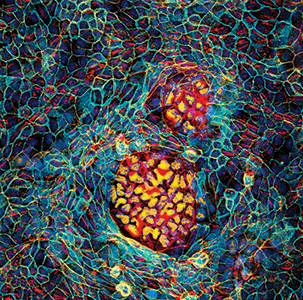Breast Cancer
-
Forward Look
Cancer Treatments and Antioxidant Supplements Can Be a Bad MixChristine Ambrosone on what her research shows.
by Sue Rochman
-
Why Skip a Dose?
A survey of over 1,000 breast cancer patients prescribed endocrine therapy sheds light on low adherence.
by Emma Yasinski
-
Facing Cancer and a Pandemic at the Same Time
Cancer patients and their families share stories of fear, love and uncertainty as they find new ways to support each other.
by Jen Tota McGivney
-
Virtual Connection in a Time of Social Distance
Responding to the coronavirus, patient advocates and nonprofits expand existing outreach initiatives and launch new ones.
by Marci A. Landsmann
-
Medicare Coverage for Next-Generation Sequencing Tests
Multigene panels that rely on next-generation sequencing are increasingly used to test for hereditary cancer risk-related mutations. The federal government aims to expand Medicare coverage for these tests.
by Ashley P. Taylor
-
On Cancer and Identity
The first time Liza Bernstein was diagnosed with cancer, she wouldn't allow it to be part of her identity. After her third cancer diagnosis, she became an advocate for other patients.
by Liza Bernstein
-
Telling Your Children About Inheritable Cancer Risk
Letting children know they might have a mutation that increases their risk for cancer can be a challenge for patients. Experts stress there is no right or wrong way to share the information.
by Marci A. Landsmann
-
Turning Up the Heat on Cancer
Researchers are working to expand the benefits of immunotherapy by making “cold” tumors “hot” so they can respond better to treatments.
by Kendall K. Morgan
-
Secure Connections
Patients find each other online and get support they say is unparalleled, but with openness comes concern about privacy.
by Kate Yandell
-
BRCA: Who Should Be Tested?
Genetic testing for mutations in the BRCA1 and BRCA2 genes creates opportunities for cancer risk reduction. But 25 years after the mutations were discovered, some who could benefit from testing are still left out.
by Sue Rochman














